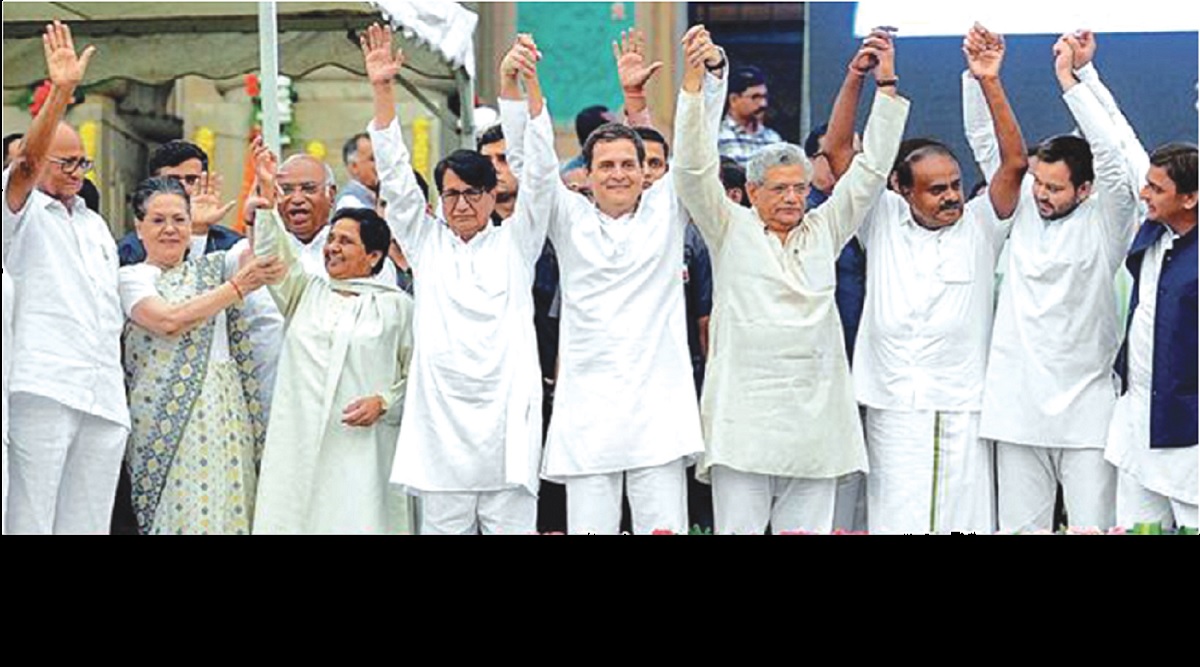With less than 100 days to go for the Lok Sabha polls, it is clear that the fight will be between two broad alliances, which are taking shape with the BJP- led NDA and the Congress-led UPA firming up arrangements. Both need the coalition arithmetic for victory while the smaller and the regional parties hold the key in this poll battle. The Congress has tied up with allies in most states including Maharashtra, Jharkhand, Tamil Nadu, Andhra Pradesh, Telengana, Bihar, Kerala and Karnataka, and is hoping for an understanding with the SP and BSP in Uttar Pradesh.
After the rout in the Hindi heartland in December, the BJP’s top leadership has realised that it needs more allies to return to power. The ruling party, which looked invincible until a few months ago, is trying to keep its partners intact ahead of the polls. Its plan is to expand in the South, West Bengal and Odisha. The BJP is taking the regional route to combat opponents. The party has yielded political space to regional allies such as Janata Dal (United), buried differences with the Shiv Sena and struck a deal in Tamil Nadu with the AIADMK.
Though the party has smaller partners, in the Hindi heartland states the only major ally that BJP now has is the JD (U). The BJP had 40 odd partners in 2014. While some of them have quit, the party has four major allies – the Shiv Sena, Akali Dal, JD (U) and Lok Jan Shakti party. In June, the BJP walked out of an alliance with the PDP in Jammu and Kashmir. Just months ahead of the Lok Sabha elections, the party has lost three key allies – Telugu Desam, the Rashtriya Lok Samata Party (RLSP) and Assam Gana Parishad. Apna Dal is flexing its muscle. The BJP has firmed up alliances with three regional parties in the past one week. They are its oldest ally, the Shiv Sena, the ruling AIADMK in Tamil Nadu and the Vanniyar dominated PMK. The big catch this week was the AIADMK. The BJP will contest five seats in the state while the AIADMK and its partners including PMK will fight the rest of the seats. In 2014, the BJP was in an alliance with six small regional parties and polled just 5.5 per cent votes to win a lone seat while the AIADMK won 37 of the 39 seats.
The AIADMK has been rudderless since the death of its charismatic leader J Jayalalithaa. Since then, it has split into three factions – one led by chief minister Edapadi Palaniswamy, the other by deputy chief minister O Pannerselvam and the third by TTV Dhinakaran, nephew of Sasikala, Jayalalitha’s companion who has been in jail since 2017 in a corruption case.
The PMK has massive support in the Vanniyar community in northern Tamil Nadu polling between five and 10 per cent of the votes since 1999. The PMK was a NDA partner in the 2014 polls but the relationship soured soon. The BJP is also talking to DMDK chief, Vijaykant. The question is while the BJP presence in the state is marginal and the AIADMK is split into factions, can the alliance make any significant impact?
This time the DMK alliance has an edge and is expected to include six other parties – CPI (M), CPI, MDMK, Muslim League, Viduhalai Chirutthai Katchi and Manithaneya Makkal Katchiand Kongu party.
In Maharashtra, which sends 48 MPs to Lok Sabha, the BJP cannot afford to get its electoral arithmetic wrong. The vote bank of both nationalist parties overlaps in many seats. In the 2014 polls, the BJP contested in 24 and won 23, while the Shiv Sena contested in 20 and won 18 seats. According to the agreement this week, BJP will contest 25 Lok Sabha seats while Sena will contest 23. It will be a fifty-fifty seat sharing arrangement in the September Assembly polls. The nearly half-and-half seatsharing arrangement this time demonstrates the realisation of their need for each other. Besides antiincumbency, they have to fight the formidable combination of the Congress and NCP with some smaller parties.
Apart from formal alliances, the BJP is also keeping channels of communication open with other prospective allies – the Biju Janata Dal in Odisha, the Telangana Rashtriya Samithi in Telangana, and YSR Congress Party and Pavan Kalyan’s Jana Sena in Andhra Pradesh. In Kerala, the BJP is in talks with Bharatiya Dharma Jana Sena, an outfit with following among the OBC Ezhava community.
The BJP needs a new narrative besides new allies. After the terror strike in Pulwama, nationalism has become the new narrative with even the RSS declaring that it is not Ram temple or any other issue that will matter but terrorism. The BJP is hopeful that this new narrative will click. Will it?











